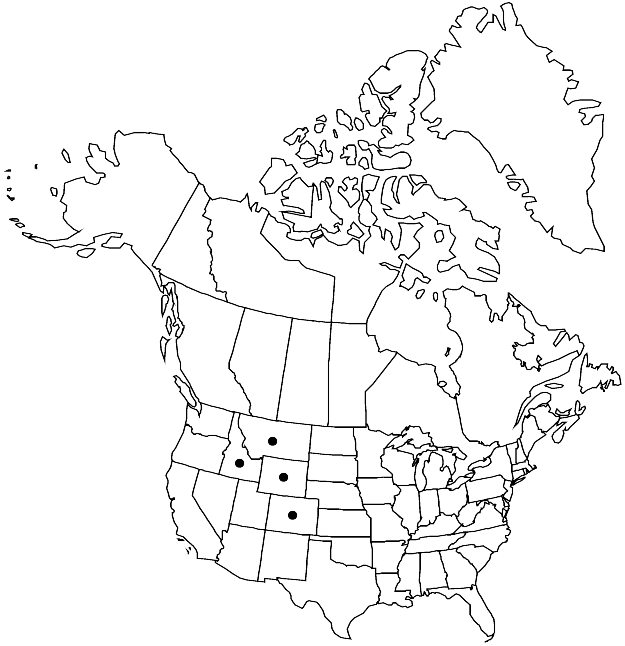Difference between revisions of "Thelypodium paniculatum"
Bull. Torrey Bot. Club 26: 126. 1899.
FNA>Volume Importer |
FNA>Volume Importer |
(No difference)
| |
Revision as of 22:52, 16 December 2019
Biennials or perennials; (short-lived); glaucous, glabrous or sparsely pubescent. Stems branched often proximally and distally, (1.4–)2–6.5(–7.5) dm, (glabrous or pubescent). Basal leaves: petiole (0.8–)2–4(–6.5) cm, ciliate; blade usually oblanceolate, rarely spatulate or oblong, (3–)6–15(–22) cm × (6–)10–25(–40) mm, margins entire, (surfaces glabrous). Cauline leaves (ascending); sessile; blade lanceolate to linear-lanceolate, (1.7–)2.2–6(–9) cm × (3–)5–15(–30) mm, (base sagittate to somewhat amplexicaul), margins entire, (surfaces glabrous). Racemes corymbose, dense, terminal not elongated in fruit, (flower buds ovate). Fruiting pedicels usually horizontal to divaricate, rarely divaricate-ascending, often curved upward, slender, 6–11.5(–17) mm, slightly flattened at base. Flowers: sepals erect, ovate to oblong-ovate, (3–)3.5–5(–6) × (1–)1.5–2 mm; petals lavender to purple, spatulate to broadly obovate, (6.5–)8–11.5(–14) × 2.5–5(–6) mm, margins not crisped, claw strongly differentiated from blade, [slender, (2–)2.5–4(–5) mm, narrowest at base]; nectar glands confluent, subtending bases of stamens; filaments tetradynamous, median pairs (3–)3.5–5(–6) mm, lateral pair (2–)2.5–4(–5) mm; anthers included, ovate to ovate-oblong, 1–2 mm, not circinately coiled; gynophore (stout), 0.5–0.8(–1.2) mm. Fruits erect, slightly torulose, usually slightly incurved, rarely straight, terete, (1–)1.3–3.2(–5) cm × (0.8–)1.5–2.3 mm; ovules 20–30 per ovary; style cylindrical, (0.5–)1.5–1.7(–3) mm. Seeds (plump), (1.3–)1.5–2 × 0.8–1 mm.
Phenology: Flowering Jun–Jul.
Habitat: Wet sedge meadows, streamsides
Elevation: 1800-2800 m
Distribution

Colo., Idaho, Mont., Wyo.
Discussion
Of conservation concern.
Selected References
None.